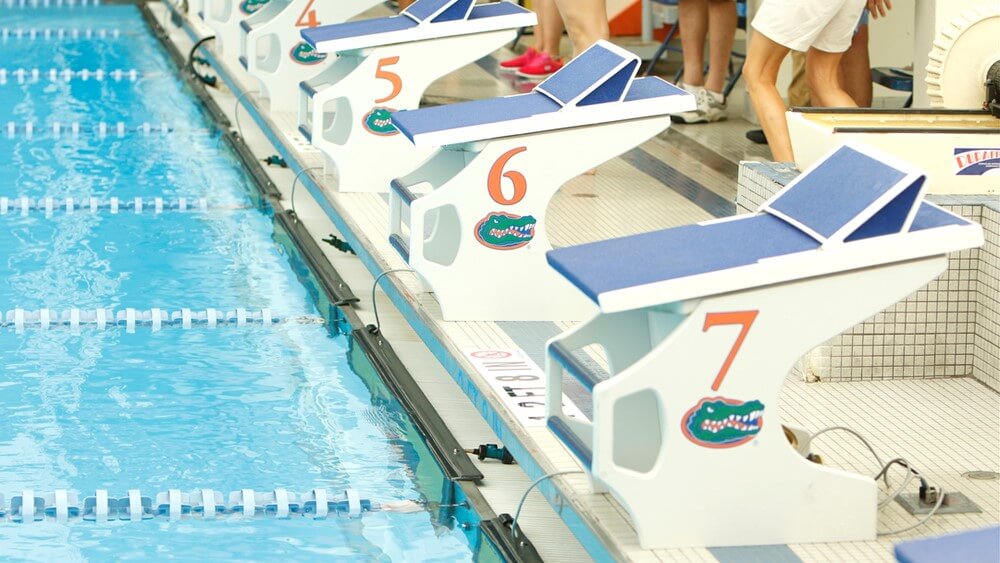Fall Swimming Fever: 8 Tips and Tricks for Managing the Early Portion of the Season

Left Sidebar
Fall Swimming Fever: 8 Tips and Tricks for Managing the Early Portion of the Season
The fall season creates many images: falling leaves, the autumn breeze, and undoubtedly the smell of pumpkin spice lattes. But in the swimming world, fall has always represented something else: the beginning of a new training season, and new opportunity. The beginning of the 11-month odyssey can be a challenge both mentally and physically. During this period, swimmers must work their way back into prime conditioning and speed after a long break. This often leads to long, difficult practices, complemented by struggles to reach best times at meets. Here are a few tips to help swimmers as they ease their way back into the pool.
- Reinforce Good Habits Early: During the initial stretch of training season, swimmers focus heavily on working back to peak conditioning. But focusing on small mechanical issues can go a long way toward finding success in February. Streamlines, turns, and underwaters are key areas that can win races, and should be part of the daily focus. I’ve been paying extra attention to my breakouts this year, attempting to not breathe in and out of walls. Emphasizing little things during the difficulty of this period of the season will only make them easier when it matters most.
- Keep Your Stroke Consistent Early: Another part of focusing on small mechanical details early should be finding a consistent stroke rate. In my article analyzing 200 swimmers in Paris, the importance of a consistent stroke rate was discussed. This strategy allows a swimmer to be efficient through consistency in stroke mechanics, even when fatigued. By holding that stroke rate during difficult sets, you can ensure stroke efficiency during tough races, just like the world’s best.
- Get a Head Start on Recovery: The early portion of the season can be grueling on the body, with both meets and practice taking a heavy toll. Settling into a recovery routine before you begin feeling heavy soreness or injury is always a good strategy. I utilize our ice baths twice a week after tough workouts, along with foam rolling and stretching when needed. By avoiding physical setbacks early in the season, you can train to your fullest to succeed later in the year.
- Find a Food Routine: There are many factors one must control at a championship swim meet, in and out of the pool. Preparing for these factors early makes these meet experiences much easier, and enables an athlete to find what works for you. One way to accomplish this goal is to identify what works food-wise for you on meet day. I’ve found myself experimenting with different carbs and fibers on meet day this season, from pancakes to waffles to oatmeal. Micromanaging the small things early can ensure racing without distractions when it matters most.
- DON”T WORRY ABOUT THE TIMES: A common theme during the early part of the swimming season is a struggle to reach best times. Multiple factors contribute to this. The lack of a taper or rest, which research from the National Institution of Health shows leads to an average 3% performance improvement is one factor. Another is simply the amount of training done, with the season just beginning. Nevertheless, it’s important to keep perspective. Even the world’s best struggle to reach best times during the early stages of the season, so put an emphasis on not setting unrealistic expectations. Instead, a good idea might be to…
- Find A Takeaway For Every Race: Without the massive weight of a championship meet, the early season allows time to nitpick and experiment with each race. Went out too fast in the 500? You know to hold back your pace for the next time. Was 10 underwater kicks off the start too many? You know to break out faster in your next swim. These lessons will allow you to be at your fastest when expected to be most successful.
- Establish a Support System: With the length of the swim season, competitors are bound to deal with a plethora of ups and downs. It’s important to establish a support system for success, so you can deal with the moments of doubt that arise. From relationships with family and friends, to methods like meditation and sports therapy, find the support which works for you.
- Enjoy Yourself: Meets are the most exciting part of this sport! Enjoy competing with your teammates and feed off each other’s energy. The most successful teams and swimmers are generally those which can balance a competitive and a fun-loving spirit. By turning stress into excitement, you’ll gain an edge on the competitors.
Subscribe
Login
0 Comments
Inline Feedbacks
View all comments



